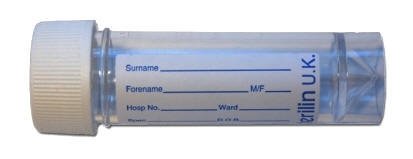CSF Oligoclonal Bands
Chemical Pathology
Notes
- Oligoclonal band investigations requires both serum and cerebral spinal fluid (CSF).
- The presence of oligoclonal bands in CSF, but not serum, is indicative of local immunoglobulin synthesis and occurs most commonly in multiple sclerosis (>90% of patients) and subacute sclerosing panencephalitis (SSPE).
- The finding of oligoclonal bands is not specific, as they may also be found in Guillain-Barré syndrome, CNS infections (including neurosyphilis and HIV infection), after cerebrovascular accidents and in other CNS disorders.
- **DO NOT SEND CSF SAMPLES VIA THE AIR TUBE. SAMPLES MUST BE TAKEN BY HAND TO PATHOLOGY RECEPTION**
Sample requirements
- CSF with paired serum sample (1 and 2 below).
- Blood must ideally be collected on the same day as the lumbar puncture, and within an absolute maximum of 14 days of lumbar puncture, for samples to be processed.
- If other CSF investigations are required please check the CSF Sample Requirements webpage for further details
- A minimum of 0.5 mL of CSF collected into a plain 30 mL Universal

(1 mL of CSF is approximately equal to 25 drops from the Luer connector of the needle).
- A minimum of 0.5 mL blood taken into a narrow gold top tube (or rust top for the Acute Unit)

Required information
Relevant clinical details including the reason for the investigation and the date of any previous lumbar puncture (if within the last month).
The date and time of the current lumbar puncture.
Turnaround times
Samples are sent for analysis to North Bristol NHS Foundation Trust with results expected back within 2 weeks.
Reference ranges
Results are given as an interpretive report.
Further information
To learn more about CSF testing, visit Lab Tests Online.
Page last updated: 29/04/2024